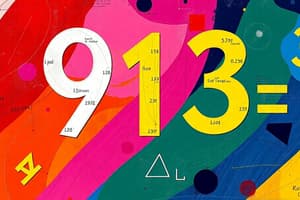Podcast
Questions and Answers
What is the form of complex numbers?
What is the form of complex numbers?
- a - bi (correct)
- a / b
- a * b
- a + b
Which number system involves the square root of -1?
Which number system involves the square root of -1?
- Rational numbers
- Real numbers
- Complex numbers (correct)
- Irrational numbers
What property states that the order of addition does not affect the result?
What property states that the order of addition does not affect the result?
- Distributive property
- Associative property
- Closure property
- Commutative property (correct)
What property does multiplication distribute over addition?
What property does multiplication distribute over addition?
Which number system is a combination of real and irrational numbers?
Which number system is a combination of real and irrational numbers?
What type of properties define a number system?
What type of properties define a number system?
Which type of number includes all natural numbers, fractions, decimals, and negative numbers?
Which type of number includes all natural numbers, fractions, decimals, and negative numbers?
Which system is commonly used for representing continuous quantities like length and temperature?
Which system is commonly used for representing continuous quantities like length and temperature?
What type of number cannot be expressed as the ratio of two integers?
What type of number cannot be expressed as the ratio of two integers?
Which of the following includes all natural numbers, fractions, and decimals that terminate or repeat?
Which of the following includes all natural numbers, fractions, and decimals that terminate or repeat?
What is a subset of real numbers that can be represented exactly using fractions or ratios?
What is a subset of real numbers that can be represented exactly using fractions or ratios?
Which type of number is represented by non-terminating, non-repeating decimal sequences with no pattern?
Which type of number is represented by non-terminating, non-repeating decimal sequences with no pattern?
Flashcards are hidden until you start studying
Study Notes
Number Systems
Number systems are the frameworks used to represent numbers in various forms, often based on the base of the system. These systems are essential for arithmetic operations and algebraic manipulations. There are several types of number systems, each with its unique properties and applications. This article will explore the real numbers, rational numbers, irrational numbers, complex numbers, and number properties.
Real Numbers
Real numbers include all the natural numbers, fractions, decimals, and negative numbers. They are used to represent continuous quantities in the physical world, such as length, mass, and temperature. The real number system is the most commonly used system in everyday calculations and scientific applications.
Rational Numbers
Rational numbers are those that can be expressed as the ratio of two integers. They are a subset of the real numbers and include all the natural numbers, fractions, and decimals that terminate or repeat after a certain pattern (e.g., 0.4375). Rational numbers are important in mathematics and science because they can be represented exactly using fractions or ratios.
Irrational Numbers
Irrational numbers cannot be expressed as the ratio of two integers. They are represented by non-terminating, non-repeating decimal sequences that have no pattern. Examples of irrational numbers include the square root of 2, pi, and e. These numbers are important in mathematics because they are used to describe the properties of many geometric and algebraic structures, such as circles, triangles, and exponential functions.
Complex Numbers
Complex numbers are a combination of real and irrational numbers. They are represented in the form a + bi, where a and b are real numbers, and i is the imaginary unit (i.e., the square root of -1). Complex numbers are important in mathematics and physics because they can be used to represent complex quantities, such as the position of a particle in a circular orbit.
Number Properties
Number properties are the characteristics that define a number system. Some essential properties of number systems include:
- Closure property: The sum or product of any two numbers in a system is also a number in that system.
- Commutative property: The order in which numbers are added or multiplied does not affect the result.
- Associative property: The way numbers are grouped in addition or multiplication does not affect the result.
- Distributive property: Multiplication distributes over addition.
Understanding these properties is crucial for working with different number systems and performing arithmetic operations.
In conclusion, the number system is a versatile tool used to represent and manipulate numbers in various forms and bases. By understanding the properties and properties of real numbers, rational numbers, irrational numbers, complex numbers, and number properties, we can better appreciate the power and flexibility of this fundamental mathematical concept.
Studying That Suits You
Use AI to generate personalized quizzes and flashcards to suit your learning preferences.




